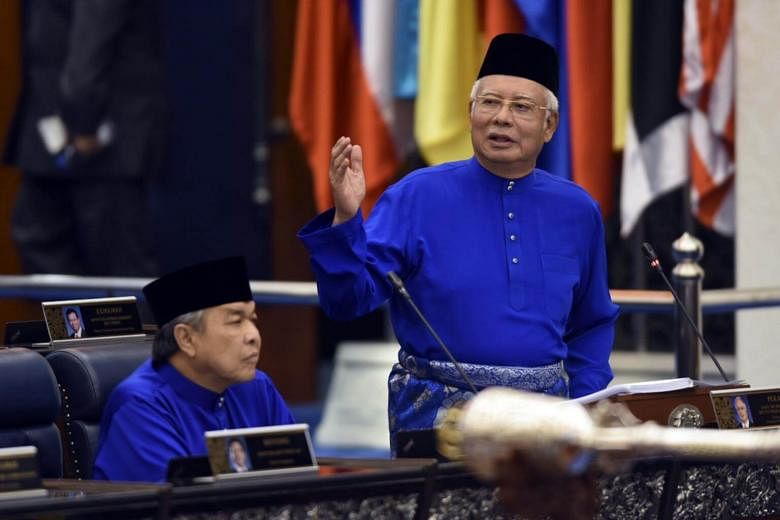KUALA LUMPUR - Malaysian Prime Minister Najib Razak on Friday (Oct 27) announced increased government spending next year that is clearly steered towards subsidies and social assistance, as he unveiled "the Mother of all Budgets" ahead of tough national elections expected to be called within months.
Everyone from babies to imams and fishermen to retirees will get something, as he unveiled a buffet of goodies to reduce widespread grouses about the high cost of living and home prices that have surged in recent years.
To international investors and ratings companies who might worry that his pre-election Budget would abandon financial discipline, he said the fiscal deficit next year will be reduced to 2.8 per cent of gross domestic product, from 3.0 per cent this year.
"This Budget that has never been crafted so well… making this Budget the Mother of All Budgets," said Mr Najib, who is also Finance Minister.
He presented a RM280.25 billion (S$90.42 billion) Budget, up 7.5 per cent from 2017, and repeated a few times during his two-hour speech that he had "good news" to share.
These included projections of stronger economic growth this year of between 5.2 to 5.7 per cent, up from an earlier forecast of 4.3 to 4.8 per cent.
-
What to know about BR1M
-
- The popular cash assistance is given out in four tranches through a year, with Malaysian households earning below RM4,000 (S$1,287) being eligible.
- The amount allocated for each BR1M category has been rising gradually each year. This year, households earning less than RM3,000 a month are given RM1,200, while families earning between RM3,001 and RM4,000 get RM900. Individuals who earn less than RM2,000 a month receive RM450.
- This year, total BR1M disbursement is RM6.6 billion, more than three times the sum distributed in 2012 when it was first implemented.
- The number of BR1M recipients has also increased, with 7.2 million recipients this year as compared to 4.2 million recipients in 2012.
- The average sum received per recipient has also risen to almost double the original amount. It rose from RM500 in 2012 to RM917 this year.
South-east Asia's third biggest economy is expected to grow between 5.0 per cent to 5.5 per cent next year.
"This is a Budget that could potentially help him at the election," said Mr Wan Saiful Wan Jan, senior fellow at the ISEAS-Yusof Ishak Institute.
Malaysia's general election is due by August next year, but is expected to be called in the next five months.
Friday was the ninth time Mr Najib had presented the Budget as Prime Minister and Finance Minister. He went further than in previous budgets to please voters, with all babies born over the next five years to get RM200 in government unit trusts, while handing out more cash to imams and bilals - mosque officials.
Mr Najib promised a whopping sum of RM6.5 billion for rural Malaysians in the agricultural and fishing industry, over three times the sum for 2017.
He said RM500 million would be set aside for a bumiputera microcredit fund that reaches almost 400,000 entrepreneurs.
The lavish gifts are seen as buttressing his vote bank of Malay and other bumiputera (indigenous) voters, who form two-thirds of the country's 32 million-strong population.
But in a surprise move, the government kept unchanged the allocation for the popular cash handout programme called BR1M. The government paid out RM6.8 billion to seven million recipients this year, and will pay out a similar amount next year.
He did not disappoint the middle income, a group that often complains about being ignored by the government.

There will be a reduction of 2 percentage points in personal income tax for those earning between RM20,000 to RM70,000 per annum, putting back RM1.5 billion worth of disposable income into the market.
"This measure will increase the disposable income of the people between RM300 to RM1,000," said Mr Najib, to cheers from his colleagues.
Economists see the government's appeal to middle-income earners as a positive boost to consumer spending.
"The Budget is being expansionary in driving domestic demand through BR1M and the personal income tax cut," said economist Alan Tan from Affin Hwang Investment.
Nomura, in its research note sees "government spending disbursements being front-loaded to the start of the year (ahead of the elections) before running a tight fiscal policy" in the second half of 2018.
Mr Najib didn't attempt to hide that his Budget is aimed at securing the vote for his ruling Barisan Nasional coalition. "Let's together ensure a big victory for Barisan Nasional in the 14th general election," he said at the end of his speech.

